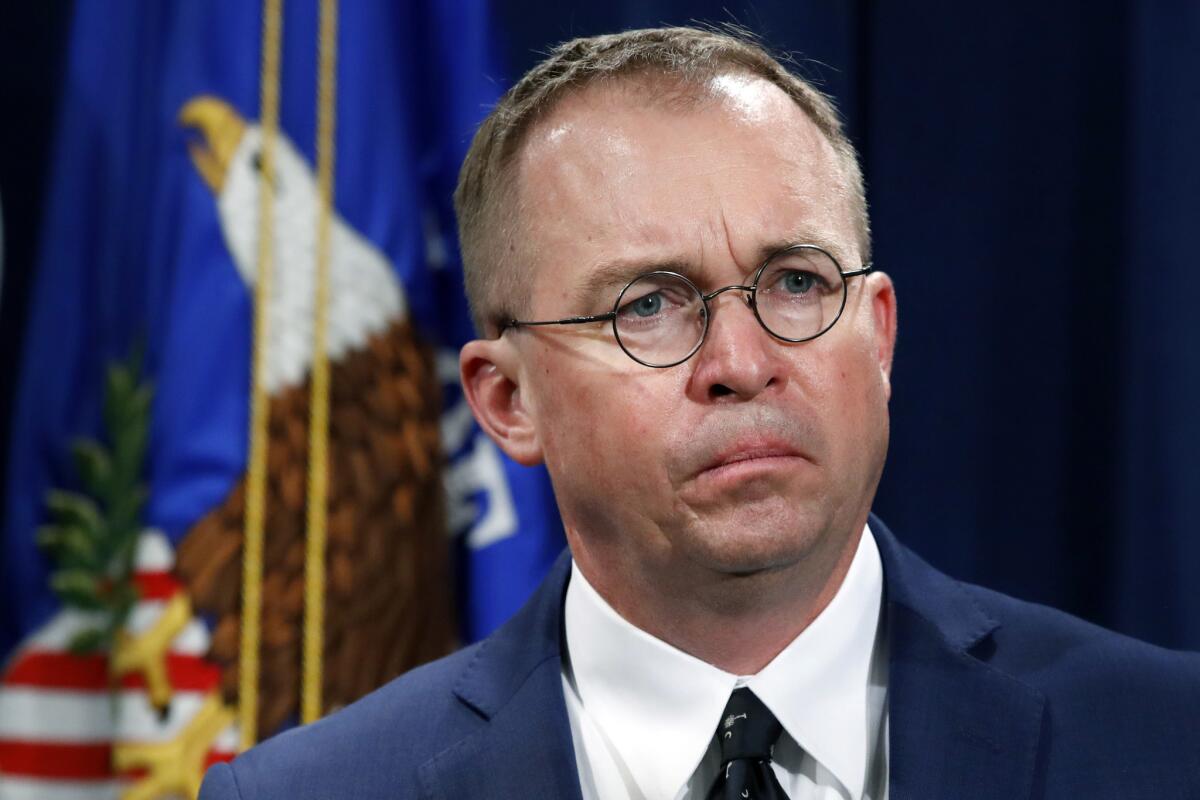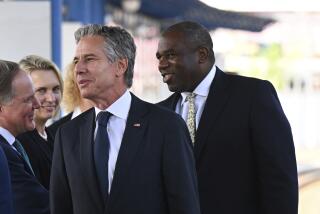Opinion: Mick Mulvaney can’t handle the truth

There’ve been so many things wrong with Mick Mulvaney’s series of explanations for why his office delayed nearly $400 million in military aid to Ukraine, it’s hard to know where to begin.
In summary, though, the acting White House chief of staff did two things no public official should ever, ever do. He denied saying what he was recorded saying at a public briefing session with reporters, wading deep into Chico Marx territory (“Who you gonna believe, me or your own eyes?”) And in trying to explain away his behavior, he admitted to overstepping the power of his office.
Mulvaney took the first step down the path toward spending more time with his family on Thursday, when he appeared to have committed what we at the Los Angeles Times like to call a “Kinsley gaffe.” That’s when an elected official inadvertently blurts out the truth.
In Mulvaney’s case, he said his office put the military aid on hold — just before President Trump placed a call to new Ukrainian President Volodymyr Zelensky — for three reasons (count ’em, three) that he explained clearly and then confirmed: The lack of support from other European nations, the amount of corruption in Ukraine, and “the corruption related to the [Democratic National Committee] server.” The third point — which was shorthand for a bizarre and discredited conspiracy theory that Ukrainians had somehow framed Russia for hacking the DNC’s email during the 2016 campaign — was put into the mix by the president himself, Mulvaney said.
When a reporter responded that “what you just described is a quid pro quo,” in which Ukraine wouldn’t get the aid unless it did the requested investigation into the DNC server, Mulvaney memorably responded, “We do that all the time in foreign policy,” adding later, “Get over it.”
Ooops. Later on Thursday, Mulvaney “walked back” what he had so painstakingly explained and confirmed to reporters, issuing a statement that President Trump had not, in fact, told him to hold the money until Ukraine agreed to investigate the DNC server issue. The only two factors, Mulvaney said, were Ukrainian corruption and the lack of support for the country from other allies.
OK, that sort of thing happens. When people in Washington say something they shouldn’t have said, either because it’s not accurate or because it’s not helpful, they put out a statement correcting the record. Hey, it’s OK! People make mistakes, even when they’re recounting something they did personally just a few months ago, and even when they seem to have a complete grasp on what motivated them.
On Sunday, however, Mulvaney went on Fox News and tried to deny saying what he had in fact said at that Thursday briefing. He didn’t say “I misspoke” or “I misremembered” or even, simply, “I was wrong.” Instead, he offered such constructions as, “That’s not what I said, that’s what people said I said.” He also claimed that he’d said there were two reasons the aid was withheld, not three and certainly not the quid pro quo involving the DNC server. Anyone can go back to the transcript and see that’s not true. It’s the version he advanced later on Thursday.
But let’s accept for a moment that the quid pro quo Mulvaney outlined in the Thursday briefing was a figment of his imagination, or of ours. He flatly stated that he unilaterally held up money that Congress had appropriated for Ukraine, which vitally needed it to defend against Russia and the separatists it’s backing. The two reasons he has since settled on — Europe’s lack of support for Ukraine and corruption within the country itself that threatened to squander the U.S. dollars — might sound like reasonable beefs. But those are calls for Congress to make, not for the White House or for Mulvaney’s former stomping grounds, the Office of Management and Budget.
Mulvaney acknowledged in Thursday’s briefing that the aid couldn’t legally be delayed past the end of the fiscal year on Sept. 30, and it wasn’t. But that’s hardly the only restriction on the White House’s authority. As this excellent explainer on the Lawfare blog notes, federal law allows OMB to delay spending money Congress has appropriated only “to provide for contingencies” or to achieve efficiencies, unless the law provides specific additional reasons.
No such circumstances existed in the case of the Ukrainian aid, which Congress appropriated at the Trump administration’s request (a request OMB had approved).
Beyond that, common sense dictates that there’s only one reason the administration would have held up the aid, knowing as Mulvaney does that the money had to be released by Sept. 30: to gain leverage over Ukraine. And what did Trump want most from Zelensky? Two things come to mind.
More to Read
A cure for the common opinion
Get thought-provoking perspectives with our weekly newsletter.
You may occasionally receive promotional content from the Los Angeles Times.











